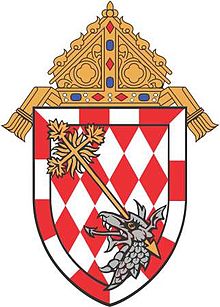Archdiocese of Toronto
|
Archdiocese of Toronto Archidioecesis Torontinus |
|
|---|---|

The Coat of Arms of the Roman Catholic Archdiocese of Toronto
|
|
| Location | |
| Country | Canada |
| Territory | Southern Ontario, Georgian Bay |
| Ecclesiastical province | Archdiocese of Toronto |
| Metropolitan | Toronto, Ontario |
| Statistics | |
| Area | 13,000 km2 (5,000 sq mi) |
| Population - Total - Catholics |
(as of 2015) 5,451,711 ?2,066,440? (32%) |
| Parishes | 221 |
| Schools | 620 |
| Information | |
| Denomination | Roman Catholic |
| Rite | Roman Rite |
| Established | December 17, 1841 |
| Cathedral | St. Michael's Cathedral |
| Patron saint | St. Michael |
| Secular priests | 798 |
| Current leadership | |
| Pope | Francis |
| Archbishop | Thomas Christopher Collins |
| Auxiliary Bishops |
John Anthony Boissoneau, Vincent Nguyen, Wayne Joseph Kirkpatrick, Robert Kasun |
| Website | |
| archtoronto.org | |
The Archdiocese of Toronto (Latin: Archidioecesis Torontinus) is a Roman Catholic archdiocese that includes part of the Province of Ontario. Its archbishop is also the eccesiatical provincial for the dioceses of Hamilton, London, Saint Catharines, and Thunder Bay. The Archbishop is Cardinal Thomas Christopher Collins (made Cardinal on February 18, 2012), with auxiliary bishops John Anthony Boissonneau, Vincent Nguyen, Wayne Kirkpatrick and Robert Kasun.
Mass is celebrated within the Archdiocese of Toronto in 36 ethnic and linguistic communities every week making the Archdiocese one of the most ethnically diverse Catholic dioceses in the world.
Overall the Archdiocese of Toronto is the largest in Canada.
The diocese was created on December 17, 1841 out of the Roman Catholic Archdiocese of Kingston and covered the western half of Upper Canada. Bishop Michael Power was appointed as the first Bishop. For a complete history, see the Archdiocese History website.
In the 1840s the major challenge was the huge unexpected influx of very poor immigrants, mostly Irish escaping the Great Famine. The fear was that Protestants might use their material needs as a wedge for evangelization. In response the Church built a network of charitable institutions such as hospitals, schools, boarding homes, and orphanages, to meet the need and keep people inside the faith. The church was less successful in dealing with tensions between the French and the Irish Catholic clergy; eventually the Irish took control.
...
Wikipedia
